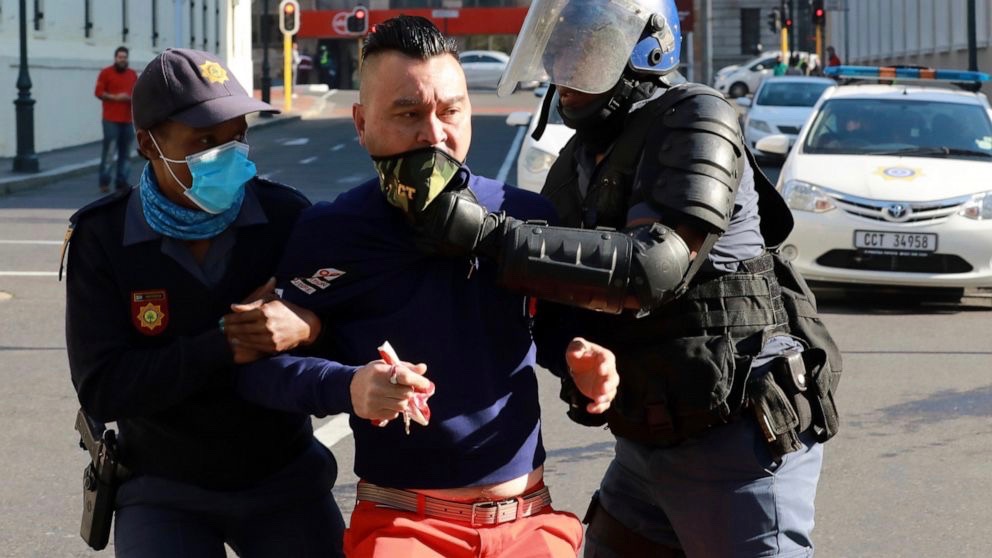On July 24, Friday, hospitality industry workers holding a peaceful protest outside the parliament precinct in Cape Town, South Africa, were met with brutal police action. The police used water cannons and stun grenades to disperse the protesters. Hospitality workers in the country face unprecedented job losses due to the COVID-19-induced lockdown.
Holding placards reading “Jobs Save Lives” and “Restaurant Lives Matter”, about 200 waiters, chefs, winery workers, owners of small restaurants, etc., had gathered outside the legislature building, demanding the lifting of the ban on alcohol sale and the curfew imposed post 9 pm.
“We strongly condemn the police brutality that we have seen during peaceful protests by hospitality sector workers and employers during the past week and we need the government to come to the table and work with us not against us,” Dominique Martin, the spokesperson of Food and Allied Workers Union (FAWU), told Peoples Dispatch.
Under the slogan “Serve Us, Please”, hospitality industry workers also staged peaceful protests in Durban, Port Elizabeth, Sandton, and outside the Union Buildings, which is the seat of the government, in capital Pretoria.
These protests are a part of the “Jobs Save Lives” campaign started by the Restaurant Association of South Africa (RASA). Earlier, under the slogan “million seats on the street,” what was reportedly the largest protest of hospitality workers was held on July 22.
As a part of the protest, restaurateurs in many towns and cities placed empty tables and chairs outside on the streets, many of which remained blocked for two hours in the afternoon.
Tables and chairs moved into the street on Kloof street, Cape Town. #JobsSaveLives #1millionseatsInTheStreets @Newzroom405 pic.twitter.com/d8L5Hj7aNo
— Athi Mtongana (@Artii_M) July 22, 2020
A poster circulated by RASA read, “Dear Mr. President, We cordially invite you to take up a seat at any of our empty tables to talk to us about the hardships we are facing.”
Restaurants were among the first businesses to be closed down after the imposition of lockdown in March. The association estimates that around 70% jobs in the restaurant industry have already been lost. This amounts to the loss of 800,000 livelihoods.
The alcohol industry has sustained a revenue loss of R18 billion (USD 1.08 billion). The consequent loss of excise collected by the government is to the tune of R.4 billion (USD 242 million).
On June 29, the lockdown was downgraded to level 3, allowing restaurants to open for sit-in service so long as physical distancing and other safety measures are followed.
While sale of alcohol was permitted, bringing some hope to winery workers, its consumption in restaurants was still prohibited. Alcohol sales amount to up to 20% of the revenue in many restaurants.
With liquor consumption in restaurants prohibited, the dinner service, which forms the major source of income, was the only means left to resuscitate finances. However, this source was also lost when the government, on July 12, reintroduced a night curfew starting from 9 pm.
Restaurant owners at Friday’s protest complained that this meant closing services to customers by 8 pm in order to have an hour left to clean the premises, wash vessels and shutter down before the curfew hours begin.
Even though an exception to the curfew was announced for those returning home from work, many staff who participated in the protests claimed that they were often stopped by the police, harassed and fined for violating curfew on their way home after work.
Along with the curfew, the government also reinstated the ban on domestic sales of alcohol, delivering a blow to workers in the alcohol industry who had just begun recuperating.
“The decision was announced with no meaningful consultation with all stakeholders, including unions,” FAWU, which represents the majority of the workers in the sector, said in a statement.
While multinational liquor companies have sufficient accumulation to weather this period of ban, “the small largely black owned businesses are the one that will be hit hardest as they suffer major financial losses,” as per FAWU.
Due to lack of prior intimation that the ban would be reinstated, many had spent their savings on stocking up spirits. Should the government have given a notice in advance, they would at the very least have spent this money on stocking up food for consumption instead of liquor for sale, FAWU said, resenting the recklessness of this decision.
Among the “lowest earners” in the sector, “one worker supports a family of more than five people and for them it remains the only source of income. The loss of each job contributes to many members of the society being subjected to hunger,” the union added.
The government’s reasoning behind the liquor ban, as articulated by president Cyril Ramaphosa in his national address on July 12, was that it would free up hospital beds which would otherwise be occupied by patients suffering from alcohol induced illnesses.
Reports however indicate that the black market is awash with alcohol. FAWU has argued that the government should have worked with them to stop this illicit trade. FAWU has been campaigning for government action to stop the illegal alcohol trade since 2016.
Instead of banning alcohol sales, putting an end to its illicit trade could have enabled the government to earn billions more in sales taxes – billions which could have been deployed “to fund quality PPE for health care workers amongst other requirements for the protection of lives,” the union said.





